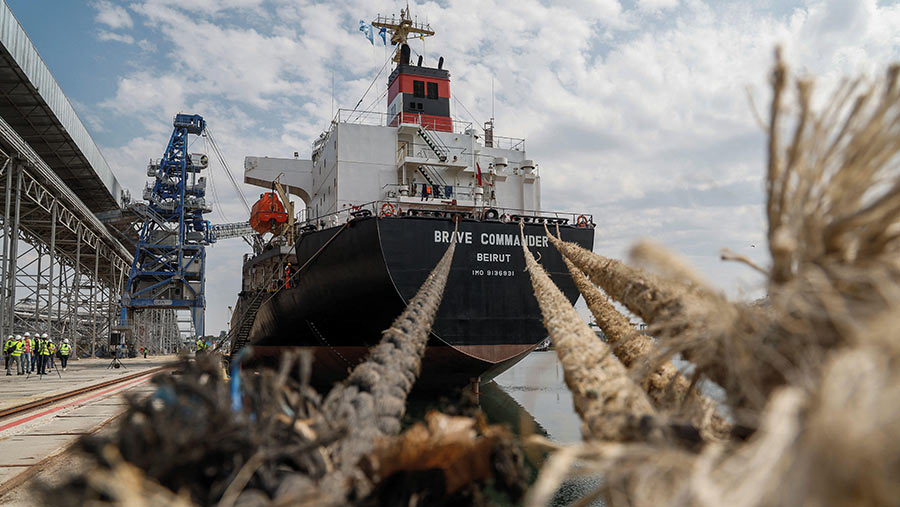Ukrainian grain exports gather pace after UN deal
 The Lebanese-flagged bulk carrier Brave Commander © Reuters/Valentyn Ogirenko/Alamy Stock Photo
The Lebanese-flagged bulk carrier Brave Commander © Reuters/Valentyn Ogirenko/Alamy Stock Photo More than 1m tonnes of grain and other foodstuffs have been exported from Ukraine since the Black Sea Deal was signed, the United Nations (UN) has confirmed.
A total of 61 cargo ships carrying about 1.5m tonnes of food have left Ukraine’s Black Sea ports since the deal was concluded, Reuters reported on Tuesday 30 August.
Citing the Ukrainian infrastructure ministry, the news agency said six ships carrying 183,000t of agricultural products left the country’s Black Sea ports on Tuesday alone.
See also: Farming in Ukraine: Q&A with agricultural journalist in the war zone
Ukrainian agriculture minister Mykola Solsky said his country’s agricultural exports could rise to between 6m and 6.5m tonnes in October – more than double the volume in July.
The UN-brokered deal to resume exports of Ukrainian grain and open a corridor allowing for food shipments was signed between Russia and Ukraine on 22 July in Istanbul, aided by Turkey.
‘Remarkable achievement’ – UN
UN co-ordinator for the Black Sea Grain Initiative, Amir Mahmoud Abdulla, said surpassing 1m tonnes of grain exports in the first month had been a “remarkable achievement” , but it was just the beginning.
“As the world grapples with food insecurity and high prices, the importance of this initiative is clear,” he added.
“As increased volumes of Ukraine’s agricultural production are now heading to market by sea, confidence has grown in the food and shipping industries, driving down prices and reducing risk.”
The initiative has also enabled the World Food Programme (WFP) to restart purchasing wheat from Ukraine for its humanitarian operations in hunger-struck countries such as Ethiopia and Yemen.
“These are all important first steps, but much more needs to be done,” stressed Mr Abdulla.
“Across the world, high prices in fuel and fertiliser, climate change and conflict are placing immense pressure on farmers and consumers alike, and driving millions more into poverty and hunger.”
Ethiopian shipment docks
After 14 days at sea, the first WFP ship carrying Ukrainian grain since the Russian invasion arrived in Djibouti on Tuesday 30 August.
The bulk carrier Brave Commander was loaded with 23,000 tonnes of grain – enough to feed 1.5 million people on full rations for a month in Ethiopia, where more than 20 million people face hunger.
David Beasley, executive director of the UN’s WFP, tweeted: “Now let’s get this wheat offloaded and on to Ethiopia.”
We have officially docked! The first @WFP ship to carry Ukrainian grain since February has just arrived in #Djibouti. Now, let’s get this wheat offloaded and on to #Ethiopia. #BlackSeaGrainInitiative pic.twitter.com/bfXxAV116v
— David Beasley (@WFPChief) August 30, 2022
Andrey Sizov, head of SovEcon, a market analysis firm focused on the Black Sea agricultural region, told Farmers Weekly: “We estimate Ukraine’s 2022 wheat crop at 20.4m tonnes from the area of 5.1m ha, the maize crop at 30.6m tonnes from 4.5m ha, and barley at 5.4m tonnes from 1.7m ha.
“We expect the winter wheat area for the 2023 crop to decline 27% to 4.9m ha from 6.7m ha a year earlier. The total wheat crop could be estimated at 20.9m tonnes. Ukraine mainly produces winter wheat.”
Farmers in Ukraine carry on farming despite the war
Kees Huizinga has been farming in Ukraine for 20 years – and he has no plans of stopping, despite Russia’s invasion.
The Dutch national has been managing a farm in the Cherkasy region, south of the capital Kyiv, for two decades and he says it is continuing to function.
Mr Huizinga, co-owner and director of Kyshchentsi Farm, said after war broke out, he was told by the Ukrainian Agrarian Council to return to the Netherlands amid fears that the Russians would switch off electricity and the internet.
But Mr Huizinga, who has become a leading figure for Ukraine’s farming resistance, decided to stay put and continue to farm the land. Despite the war, his farm is still evolving and a new cow shed and road are now being constructed.
In a video posted on YouTube, Mr Huizinga said the world is now starting to understand the importance of global food security.
“Now they start to understand, because they feel it. Prices have gone sky high,” he added.
“There’s no sunflower oil. It’s become, three, four, five, maybe six times more expensive. They see a lot more hunger in Africa.
“The only way the world can help us is by sending more heavy weapons for us to chase the Russians out of Ukraine.”
After the war, Mr Huizinga says Ukrainian farmers will need help from nations including the US and Canada to invest in agriculture and rebuild.
